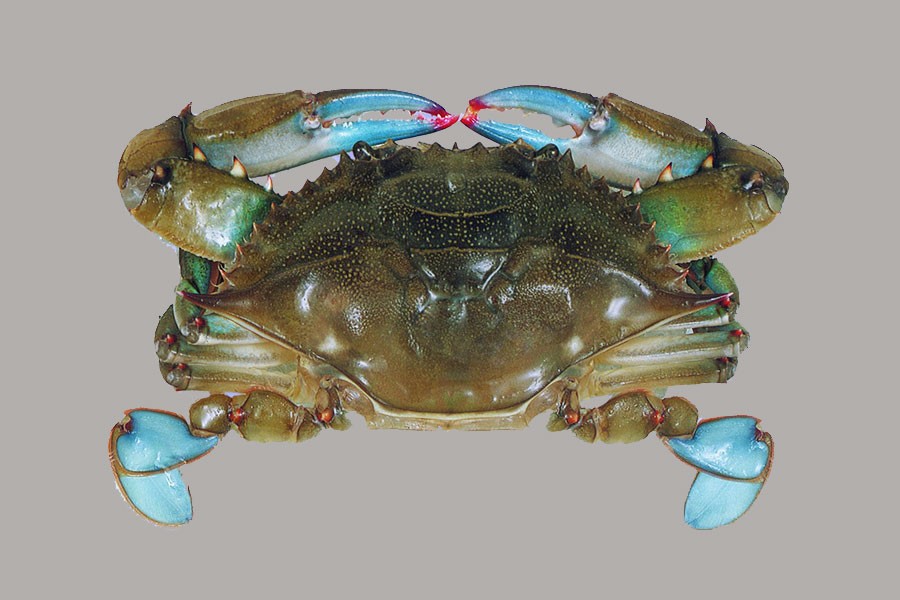Soft-shell crab farming has opened a new export opportunity for Bangladesh in the global market apart from creating fresh employment for the coastal community.
Entrepreneurs and local fish farmers in the south-western district of Satkhira are now opting for large-scale soft-shell crab farming. There is an increasing demand for the food item in the international markets, including Hong Kong, Japan, Korea, Malaysia, Taiwan and Thailand.
Soft-shell crab is regular form of crab, which needs different farming method. Farmers collect crabs from natural sources to take to farms, and monitor those in every three hours.
Then, farmers shift the collected crabs from saline water to boxes containing pure drinking water immediately after the creatures replace their old hard exoskeleton (shell).
The certain type of crab is being cultured mainly for export. Farmers sell the soft-shell crab in the wholesale market at prices ranging from Tk 350 to Tk 800 per kg based upon sizes.
Ram Krishna Joardar, a soft-shell crab farmer, started the farming along with his three friends in a small-scale in 2018. He now has 35,000 plastic boxes (each box for a crab).
There were about five soft-shell crab farms in Satkhira, and the number now stands at over 200. Among these, 8-10 are big farms, and the rest are small and middle in size.
Most of the owners of the big- and middle-sized crab farms are not local people. They are entrepreneurs from outside the district, as the business needs handsome working capital, he added.
Local people, who were earlier brickfield workers and day labourers, are now working in the crab farms as labourers or are collecting crabs from the Sundarbans for the farms, Md Sayful Islam, another farmer, told the FE.
New farmers in the surrounding areas are gradually getting more and more interested towards soft-shell crab farming, which is creating fresh scopes of employment, he added.
He, however, alleged that the authorities concerned irrationally impose ban in an inappropriate time to stop farmers from going to the Sundarbans to collect items like - prawn fry, crab, fish, fish fry and honey, which ultimately brings no positive result for the forest.
Furthermore, some fishermen destroy and kill crabs during fishing in the Sundarbans and nearby rivers, he added, urging to create awareness in this regard.
Meanwhile, collecting a large quantity of crabs and other fish fry from the Sundarbans and other natural sources for commercial farming has emerged as a threat to the environment and biodiversity of the world's largest mangrove forest, opined experts concerned.
Pavel Partha, an independent researcher working in the region, told the FE that commercial farming of soft-shell crab has opened a new door for the country to earn foreign currency.
But it is also posing threat to the environment and biodiversity of the Sundarbans in addition to the communities living around the forest.
He urged the authorities concerned to take immediate measures to build awareness as well as to restrict increased catching of crab and other fish fry to protect the ecological balance of the Sundarbans.
Besides, there is only a single artificial breeding centre, which needs to be expanded and increased in number to reduce dependency on the Sundarbans, the expert noted.
Senior fisheries official of Satkhira district Md Rashidul Haque told the FE that they do help the farmers by providing guidance and suggestions for crab farming.
Besides, they have built a crab hatchery in Cox's Bazar under a project to promote crab farming in the country, especially for local farmers.
He, however, admitted the complexity over imposing ban to check entering the Sundarbans.
The regional office concerned has already placed the issue to the Ministry of Fisheries and Livestock in written format to revise the ban. The ministry would fix the timing after doing necessary research, he added.
Currently, some 252 hectares of land are being used for crab farming in Satkhira district, and some 32,000 local people are involved in it, according to the official.
Some 1,934 tonnes of crab were produced in the district last year, and of these some 1,440 tonnes were soft-shell crabs. About 90 per cent of the soft-shell crab was exported to different countries, he added.
Export of all sorts of crab brought US$ 3.75 million in July-August of this fiscal year, 2018-19, according to the Export Promotion Bureau, Bangladesh (EPB).


